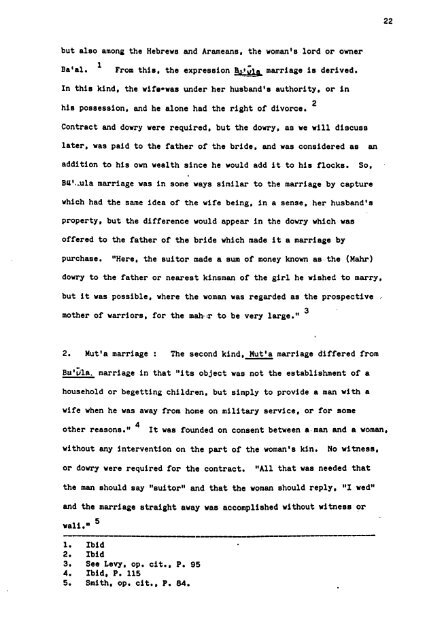Download - University of Salford Institutional Repository
Download - University of Salford Institutional Repository
Download - University of Salford Institutional Repository
Create successful ePaper yourself
Turn your PDF publications into a flip-book with our unique Google optimized e-Paper software.
ut also among the Hebrews and Arameans, the woman's lord or owner<br />
Balal.<br />
1<br />
From this, the expression marriage is derived.<br />
In this kind. the wifsowas under her husband's authority. or in<br />
his possession. and he alone had the right <strong>of</strong> divorce.<br />
Contract and dowry were required, but the dowry, as we will discuss<br />
later, was paid to the father <strong>of</strong> the bride, and was considered as an<br />
addition to his own wealth since he would add it to his flocks. So,<br />
B41-ula marriage was in some ways similar to the marriage by capture<br />
which had the same idea <strong>of</strong> the wife being, in a sense. her husband's<br />
propertyq but the difference would appear in the dowry which was<br />
<strong>of</strong>fered to the father <strong>of</strong> the bride which made it a marriage by<br />
purchase. "Here, the suitor made a sum <strong>of</strong> money known as, -the<br />
2<br />
(Mahr)<br />
dowry to the father or nearest kinsman <strong>of</strong> the girl he wished to marry,<br />
but it was possible, where the woman was regarded as the prospective -<br />
mother <strong>of</strong> warriors. for the mah, --r to be very large. " 3<br />
2. Mutla marriage The second kind, Mutla marriage differed from<br />
BuIV'la. marriage in that "its object was not the establishment <strong>of</strong> a<br />
household or begetting children. but simply to provide a man with a<br />
wife when he was away from home on military service. or for some<br />
other reasons. " 4<br />
It was founded on consent between a-man and a woman,,<br />
without any intervention on the part <strong>of</strong> the woman's kin. No witness#<br />
or dowry were required for the contract. "All that was needed that<br />
the man should say "suitor" and that the woman should reply* "I wed"<br />
and the marriage straight away was accomplished without witness or<br />
walie" 5<br />
1. Ibid<br />
2. Ibid<br />
3. See Levy, op. cit., P. 95<br />
4. Ibid. P. 115<br />
5. Smith, op. cit., P. 84.<br />
22
















